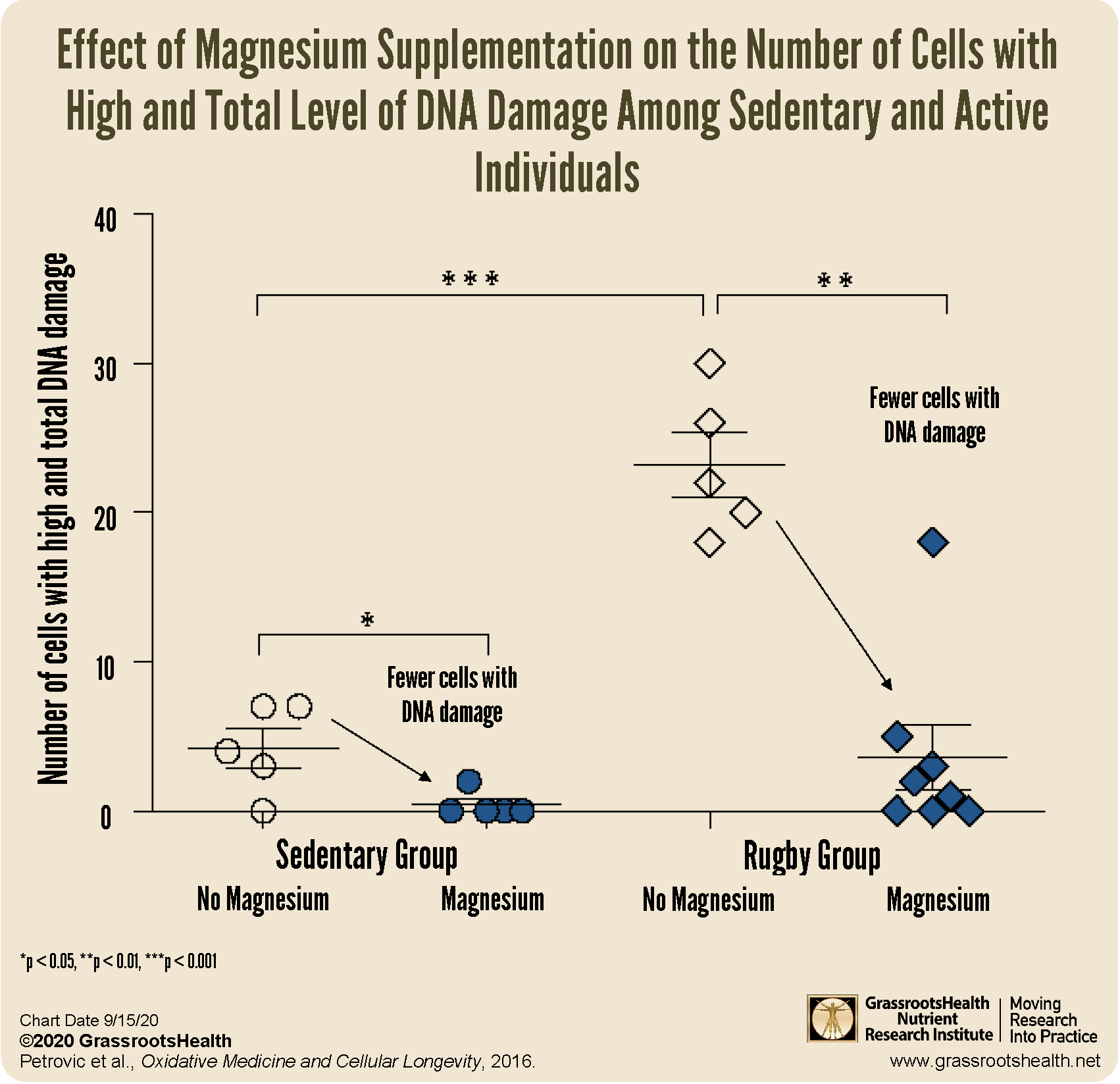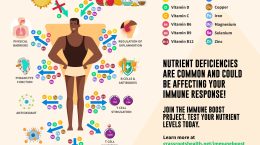Published on September 16, 2020
DNA damage is a result of oxidative stress and excess inflammation that may be present due to several factors of daily life, including poor diet, nutrient deficiencies, exposure to toxins, lack of sleep, stress, and excessive physical exercise. When left unchecked, DNA damage can impair cellular function and lead to chronic diseases such as cancer, autoimmune diseases, cardiovascular disease and more.
Several nutrients, such as zinc, vitamin D, vitamin C, and omega-3 fatty acids are known to have protective effects against DNA damage due to oxidative stress.
Could magnesium intake decrease DNA damage?
 Magnesium is a cofactor in hundreds of enzymes including those involved in DNA metabolism, replication and repair, and protection of DNA from oxidative damage. Some studies have shown that magnesium is essential for protecting DNA from damage and maintaining the integrity of DNA structure. To study the effect of magnesium on oxidative damage to DNA, Petrovic et al. took a group of 10 sedentary men (university students) and a group of 13 physically active men (rugby players) and assigned them to four weeks of magnesium supplementation (500 mg/day) or supplementation with placebo.
Magnesium is a cofactor in hundreds of enzymes including those involved in DNA metabolism, replication and repair, and protection of DNA from oxidative damage. Some studies have shown that magnesium is essential for protecting DNA from damage and maintaining the integrity of DNA structure. To study the effect of magnesium on oxidative damage to DNA, Petrovic et al. took a group of 10 sedentary men (university students) and a group of 13 physically active men (rugby players) and assigned them to four weeks of magnesium supplementation (500 mg/day) or supplementation with placebo.
The rugby group were all members of the same team that trained for 2 hours, 3-4 times per week, and participated in a weekly match. The sedentary group included university students who were not involved in any regular exercise, during the study or 6 months prior.
Blood was collected from all participants after the 4 week supplementation period. The samples were analyzed for DNA damage before and after exposure to oxidative stress, using hydrogen peroxide (H2O2). Samples were classified based on DNA migration as no damage (<5% DNA migration), low level damage (5-20%), medium level damage (20-40%), high level damage (40-95%) and total damage (>95%).
What were the results of the study?
Analysis of the blood samples showed much less DNA damage present in the samples from the magnesium supplemented groups compared to the placebo groups, for all samples (the H2O2 exposed cells and non-exposed cells).
The chart above illustrates the difference in the number of cells with high and total DNA damage detected after samples were exposed to H2O2 to induce oxidative stress. As can be seen, the level of DNA damage present was significantly less among those who received 4 weeks of magnesium supplementation in both the sedentary group and physically active group, compared to those receiving placebo.
Rugby players with their active training schedule had more highly and totally damaged cells than the sedentary group, with the total highest damage among the rugby players who received placebo.
While there was no significant difference in DNA damage between the sedentary and physically active groups who received magnesium supplementation, the effect of magnesium was pronounced in those who were physically active – the rugby players who received magnesium had significantly less DNA damage compared to the rugby players who did not receive magnesium.
What Does This Mean?
Overall, the findings of this study support the evidence that strenuous exercise can contribute to oxidative stress and DNA damage, and that magnesium supplementation may reduce that effect and protect DNA from damage induced by oxidative stress.
Nutrients Work Together for Immune and Overall Health!
Oxidative compounds are produced during exercise and also by immune cells. Immune cells create reactive oxygen species to kill invading organisms that cause infection, however, these reactive oxygen species can also cause damage to surrounding human cells. As a result, an active immune response can cause oxidative stress particularly when deficiencies in nutrients (such as those that act directly as antioxidants or contribute to antioxidant enzyme function) are present.
Could getting more of certain immune boosting nutrients help to decrease your levels of inflammation, and improve your immune response? Find out by testing your vitamin D, omega-3s, magnesium and other essential elements (including copper and zinc), as well as your inflammation levels, with the new Immune Boost home test kit offered by GrassrootsHealth. Measuring levels is the only way to know if you are supporting your immune system and whether additional changes should be made, with supplementation, dietary changes, or both.
What Does it Take YOU to Get Your D to 40 ng/ml (100 nmol/L)?
Did you know your health could be greatly affected by making sure you have a vitamin D level of at least 40 ng/ml (100 nmol/L)? Help us help you.
STEP 1 – Do you know what your vitamin D level is? If not, be sure to test today to find out.
STEP 2 – Determine your target level. Are you at your target level? Experts recommend a level of at least 40-60 ng/ml (100-150 nmol/L).
STEP 3 – Need to boost your level? Use the D*calculator to see how much vitamin D it may take to reach your target. Opt for the Loading Dose for a quicker boost.
STEP 4 – Optimize how your body absorbs and utilizes vitamin D with co-nutrients and these simple steps.
STEP 5 – Re-Test! This is an important step to make sure you have reached your target level, and to ensure you are not taking too much! Re-testing after 3-4 months is recommended.
STEP 6 – Adjust, Repeat…
Give your immune system the nutrients it needs to support a healthy you and protect yourself from unnecessary diseases. Specific markers that influence health are suggested for testing including:
- Vitamin D
- Omega-3 Index
- Essential elements magnesium, selenium, and zinc
- hsCRP
Through GrassrootsHealth Nutrient Research Institute, you can also test your essential elements magnesium, copper, zinc and selenium, toxins such as lead, mercury and cadmium, as well as your omega-3 levels, inflammation levels and thyroid stimulating hormone (TSH) level. Find out your levels today! Log on to the test selection page (click the link below) to get your tests and see for yourself if your levels can be improved.
Make sure you track your results before and after, about every 6 months!
How can I track my nutrient intake and levels over time?
To help you track your supplement use and nutrient levels, GrassrootsHealth has created the Personal Health Nutrient Decision System called
For each specific supplement, you can track what days you take it, how much, and many other details. This will help you know your true supplemental intake and what patterns of use work for you to reach and maintain optimum nutrient levels. Check it out today!









